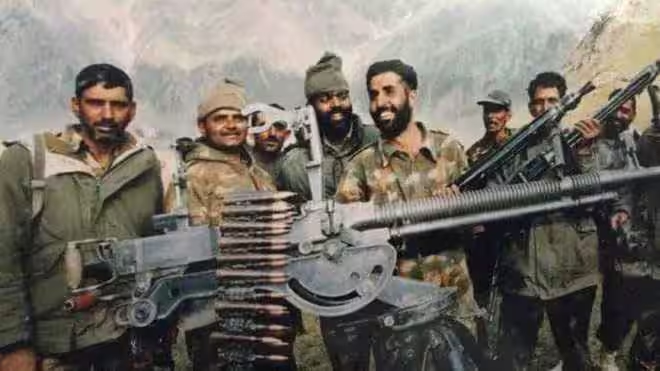Captain Vikram Batra – The Kargil Hero
Captain Vikram Batra is one of the most iconic and revered heroes in Indian military history. His courage, determination, and sacrifice during the Kargil War of 1999 earned him the Param Vir Chakra—India’s highest wartime gallantry award—posthumously. His unwavering spirit and leadership under extreme circumstances continue to inspire millions of Indians today.
Early Life and Dreams of Serving the Nation
Vikram Batra was born on September 9, 1974, in the small town of Palampur, Himachal Pradesh. Coming from a middle-class family, Batra was an enthusiastic and adventurous young man. His father, a government employee, and his twin brother, who was also passionate about sports, were key influences in his life. From a young age, Vikram showed a keen interest in the armed forces, often participating in activities that involved discipline, physical fitness, and leadership.
After completing his schooling at D.A.V. School in Palampur, Vikram went on to study at Punjab University, where he earned a degree in Bachelor of Arts. While in college, he excelled in sports, particularly in martial arts and rock climbing. His passion for serving in the Indian Army was evident, and despite facing initial challenges, he decided to pursue his dream of joining the Indian Military Academy (IMA).
Vikram Batra’s determination paid off when he joined the IMA in 1996. After rigorous training, he was commissioned into the 13th Battalion of the Jammu and Kashmir Rifles (13 JAK RIF) in 1997, which was stationed at Srinagar. Known for his charismatic personality, confidence, and leadership abilities, he quickly gained the affection and respect of his peers and superiors.
The Kargil War: A Hero’s Journey
The Kargil War between India and Pakistan broke out in May 1999, with Pakistani forces infiltrating Indian territory along the Line of Control (LoC) in the Kargil sector of Jammu and Kashmir. The task of pushing back the infiltrators fell to the Indian Army, and the conflict was fought in the difficult terrain of the Himalayan mountains at extremely high altitudes.
Captain Vikram Batra, known for his bravery and selflessness, was deployed to the Kargil sectorduring the war. He was tasked with recapturing a series of strategic heights that had been occupied by Pakistani forces, including the key point known as Point 5140. What made the mission particularly difficult was the heavily fortified enemy positions and the harsh, unforgiving weather conditions in the region.

The Battle for Point 5140
One of the most defining moments of Captain Batra’s career came during the battle to capture Point 5140. On June 20, 1999, Vikram Batra and his unit were given the responsibility of capturing the enemy-held position at Point 5140. This operation was critical because whoever controlled the point would have a significant strategic advantage in the Kargil region.
As Vikram and his men climbed the treacherous slopes of the mountain, they were met with intense enemy fire. Despite the overwhelming odds, Captain Batra led from the front. Under constant fire, his unit made significant advances toward the top. The battle was brutal, with casualties mounting on both sides. Despite being injured in the process, Captain Batra refused to retreat. His leadership and indomitable spirit spurred his men to continue the fight.
When the enemy forces began to close in on them, Captain Batra fought valiantly, ultimately capturing the point. His bravery during this battle became legendary, and it was a turning point in the war. As the battle raged on, Captain Batra was quoted as saying, “Yeh dil maange more” (This heart desires more), which became a slogan of heroism and determination.
The Final Sacrifice
While Captain Batra’s leadership in the Battle of Point 5140 was a shining example of courage, his most heroic and tragic act came shortly thereafter. On July 7, 1999, Captain Batra was leading an assault on another peak known as Point 4875. While his unit was advancing, they were ambushed by enemy forces, and Captain Batra was hit by enemy fire.
Despite his injuries, Captain Batra continued to lead the assault, inspiring his troops to push forward. In a final, selfless act of bravery, Captain Batra neutralized several enemy soldiers before succumbing to his injuries. His last words, reportedly to his fellow soldiers, were “I will either come back after raising the Indian flag, or I will come back wrapped in it”. His body was found later with the Indian flag draped over it, symbolizing his sacrifice.
The Legacy of Captain Vikram Batra
Captain Vikram Batra’s bravery during the Kargil War made him a national hero. He was posthumously awarded the Param Vir Chakra, India’s highest military honor, for his acts of extraordinary bravery and leadership. His legacy lives on not only through his gallantry in battle but also through his unwavering patriotism, sense of duty, and love for the country.
Vikram Batra’s story continues to inspire generations of young Indians to serve the nation, be courageous in the face of adversity, and lead with honor. His life was a shining example of the sacrifices made by the soldiers who protect our borders, often at the cost of their lives.
In Conclusion:
Captain Vikram Batra’s life and sacrifice are a testament to the indomitable spirit of the Indian soldier. His story is one of courage, leadership, and unflinching resolve, and his sacrifice during the Kargil War has etched his name forever in the hearts of Indians. Captain Batra gave his life to protect the sovereignty and integrity of his nation, and his memory continues to inspire patriotism, selflessness, and bravery in all who hear his story.
As the Kargil War Hero and the epitome of courage, Captain Vikram Batra will always remain in the collective memory of India as a true patriot, a warrior, and a beloved son of the nation